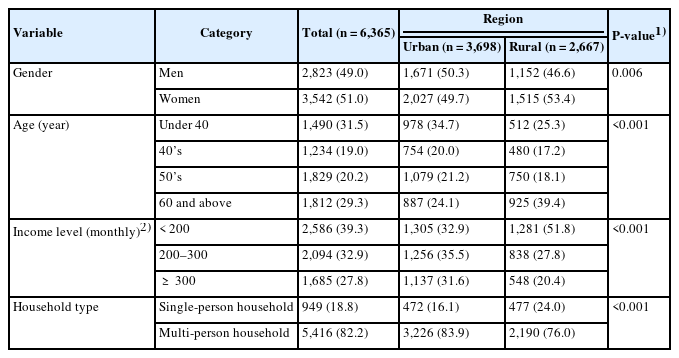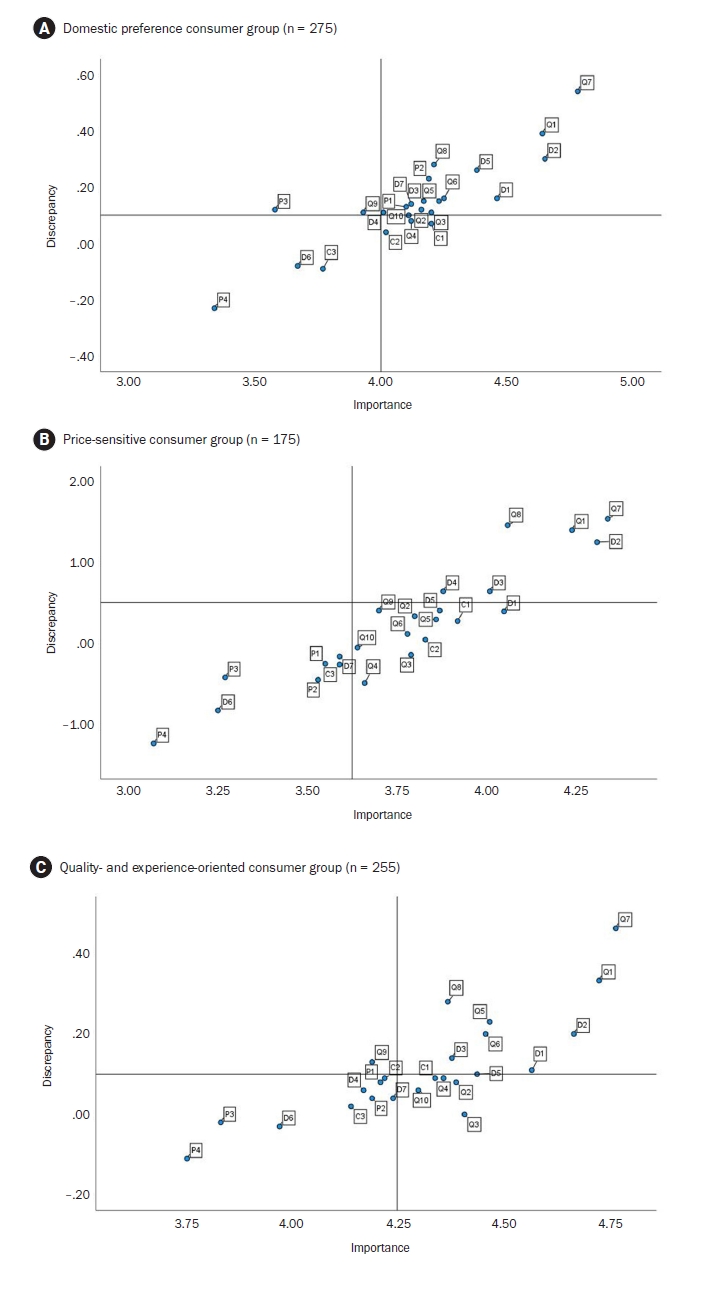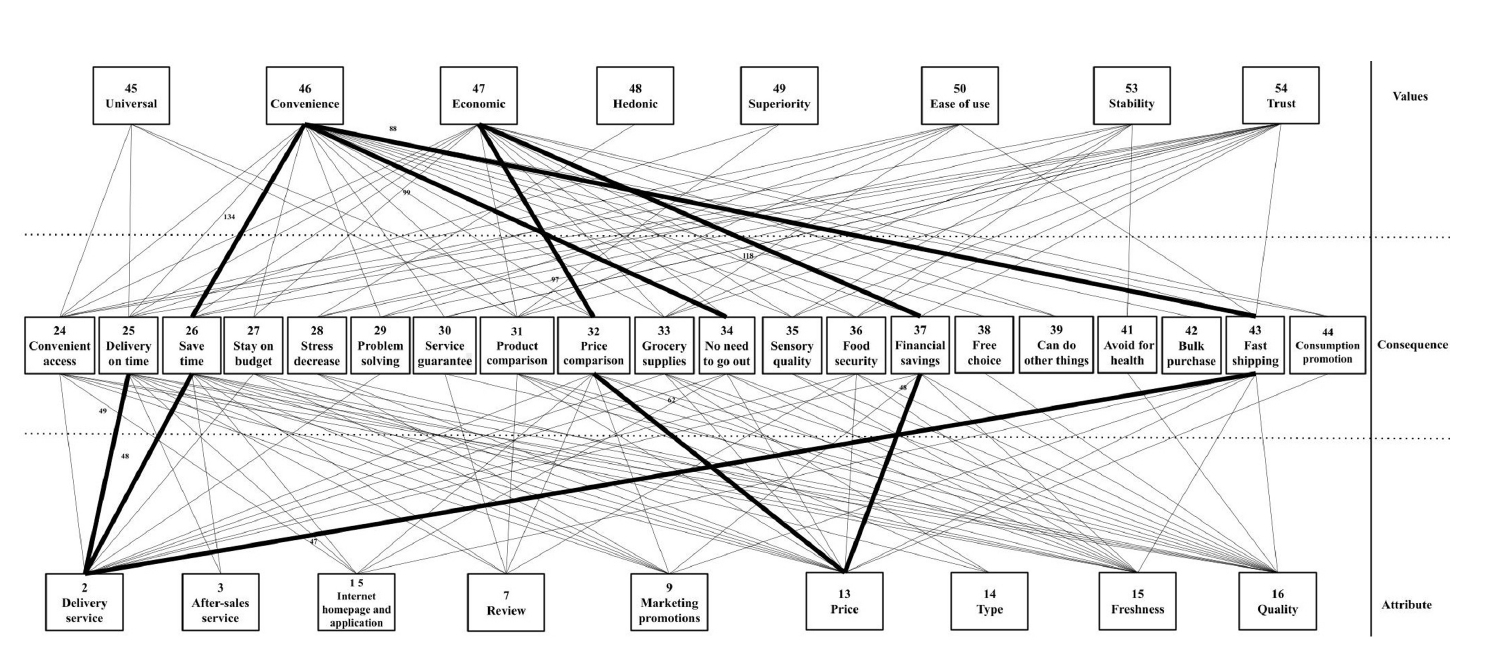Search
- Page Path
- HOME > Search
Research Articles
- [Korean]
- A study on regional differences in dietary behaviors and satisfaction in Korea focusing on urban and rural comparisons: a cross-sectional study
- Jong-Youn Rha, Sohyun Kim, Hae-Rang Lee, Juhyeon Kil
- Korean J Community Nutr 2025;30(2):140-149. Published online April 29, 2025
- DOI: https://doi.org/10.5720/kjcn.2024.00262

-
 Abstract
Abstract
 PDF
PDF - Objectives
This study aims to examine regional differences in dietary behavior and satisfaction between urban and rural residents in Korea, identifying key factors associated with dietary satisfaction in each group to deepen understanding of these variations.
Methods
The data were obtained from the Consumer Behavior Survey for Food 2022 by the Korea Rural Economic Institute. The analysis involved 6,365 adult participants, using the complex survey χ2-test and complex survey t-tests to compare dietary behavior across regions and complex survey regression analysis to explore factors related to dietary satisfaction. Data were analyzed with R 4.3.1 (for macOS; Posit PBC).
Results
Urban and rural areas differed in consumer characteristics such as gender, age, income, and household type, as well as in food consumption behaviors and in dietary competencies associated with purchasing and intake. Specifically, dining out and processed food consumption were more prevalent in urban areas, whereas home-cooked meals were more frequent in rural areas. Overall, dietary competencies were higher among urban residents. However, there was no significant difference in dietary satisfaction between the two regions. This finding suggests that satisfaction is based on subjective evaluations, with consumers in each region forming satisfaction in ways that align with their environment and lifestyle. Accordingly, the factors contributing to dietary satisfaction differed by region. In urban areas, information utilization competency and maintaining a balanced diet played a significant role in dietary satisfaction, whereas in rural areas, regular mealtimes were more influential. Urban consumers reported higher dietary satisfaction when meals provided a sense of appropriate convenience, whereas rural consumers showed greater satisfaction when meals were shared with family at home.
Conclusion
The findings indicate regional differences in food consumption behaviors and dietary competencies, as well as variations in how consumers achieve dietary satisfaction. These insights provide a foundation for developing dietary policies and programs aimed at improving dietary satisfaction.
- 1,503 View
- 52 Download

- [English]
- Understanding the charactersitics and types of single-person households based on food purchase frequencies in Korea: a cross-sectional study using the 2023 Consumer Behavior Survey for Foods
- So-Yun Kim, Youngmin Nam, Jong-Youn Rha, Haerang Lee
- Korean J Community Nutr 2025;30(1):27-39. Published online February 28, 2025
- DOI: https://doi.org/10.5720/kjcn.2025.00031

-
 Abstract
Abstract
 PDF
PDF - Objectives
This study investigated the differences in food purchase frequency among single-person households by gender and age group and explored the characteristics of single-person household groups according to their food purchase patterns.
Methods
Utilizing data from the 2023 Consumer Behavior Survey for Foods conducted by the Korea Rural Economic Institute, this study examined food purchase frequencies among 966 single-person households. Data were analyzed using Rao-Scott chi-square tests, ANCOVA, ANOVA, and K-modes hierarchical cluster analysis.
Results
Significant differences were observed in the food purchase frequencies of single-person households for fresh and convenient food. Women displayed higher purchase frequencies for fish, vegetables, and fruits, whereas men showed higher purchase frequencies for convenient foods (P < 0.005). Single-person households aged 39 years and younger exhibited lower purchase frequencies for vegetables (P < 0.005) and fish (P < 0.001) and substantially higher frequencies of convenient food purchases (P < 0.001). Additionally, this study identified three distinct single-person household groups based on food purchase pattern: the “nutrition-conscious” group, which exhibited high purchase frequency for fresh foods; the “convenience-seeking” group, which showed high purchase frequency for all types of convenient foods; and the “passive food consumer” group, which displayed relatively low purchase frequency for both fresh foods and convenient foods. The socio-demographic characteristics of single-person households differed significantly across these three groups, with the “passive food consumer” group and “convenience-seeking” group exhibiting lower healthy eating competency (MN(nutrition-conscious group) = 3.68, MP(passive-food-consumer group) = 3.40, MC(convenience-seeking group) = 3.52, P < 0.001), safe eating competency (MN = 3.87, MP = 3.57, MC = 3.77, P < 0.001), and satisfaction (MN = 3.36, MP = 3.23, MC = 3.25, P = 0.04) than the “nutrition-conscious” group.
Conclusion
This study underscores the need for targeted nutrition programs to address the unique needs of single-person households depending on their characteristics. Specifically, this study highlights the importance of targeted interventions for “convenience-seeking” and “passive food consumer” to promote dietary competency and encourage healthy dietary behavior. -
Citations
Citations to this article as recorded by- Secular trends in dietary patterns among Korean adults: using data from the 2007–2022 Korea National health and nutrition examination survey
Eunyoung Tak, Juhae Kim, Heejin Lee, Minji Kang
Nutrition Journal.2025;[Epub] CrossRef
- Secular trends in dietary patterns among Korean adults: using data from the 2007–2022 Korea National health and nutrition examination survey
- 11,140 View
- 92 Download
- 1 Crossref

- [Korean]
- Analysis of pork consumption attribute factors by consumer lifestyle in Korea: a cross-sectional study
- Jounghee Lee, Juhyun Lee, Wookyoung Kim
- Korean J Community Nutr 2025;30(1):75-88. Published online February 28, 2025
- DOI: https://doi.org/10.5720/kjcn.2024.00332

-
 Abstract
Abstract
 PDF
PDF - Objectives
This study aims to identify and analyze how different South Korean lifestyles impact attitudes towards pork consumption.
Methods
We implemented a cross-sectional survey targeting 705 adult consumers in South Korea using hierarchical and K-means cluster analyses. Respondents were classified into three relevant lifestyles: (1) domestic preference, (2) price-sensitive, and (3) quality-experience-oriented. The importance-performance analysis was employed to evaluate discrepancies between how they rated pork consumption using factors of “importance” and “satisfaction”. We employed Borich’s needs assessment and the Locus for Focus model to prioritize management areas.
Results
The research findings highlight that unpleasant odor/smell (Q7) and hygiene (Q1) were common key areas for management across all consumer groups, emphasizing their importance in enhancing pork consumption satisfaction. Among the groups, the domestic preference group showed high importance-performance discrepancies in attributes like expiry date (D2), suggesting a need for strengthened trust in domestic pork distribution and information transparency. The price-sensitive group prioritized economic factors, with fat thickness (Q8) identified as an essential management area. The quality-experience-oriented group emphasized sensory qualities such as juiciness (Q6) and meat color (Q5), with off-flavors (Q7) displaying the largest discrepancy. These results show the significant role of sensory attributes in consumer satisfaction.
Conclusion
This study demonstrated the multidimensional nature of pork consumption behavior, emphasizing the need for tailored strategies across consumer groups. Managing hygiene (Q1) and reducing off-flavors (Q7) are critical for all segments, while group-specific strategies include managing sensory quality for the quality-experience-oriented group, providing product information (D2) to increase trust for the domestic preference group, and emphasizing value for money for the price-sensitive group.
- 1,961 View
- 43 Download

- [English]
- Exploring the customer perceived value of online grocery shopping: a cross-sectional study of Korean and Chinese consumers using Means-End Chain theory
- Xinyu Jiang, Hyo Bin Im, Min A Lee
- Korean J Community Nutr 2024;29(4):318-335. Published online August 31, 2024
- DOI: https://doi.org/10.5720/kjcn.2024.00007

-
 Abstract
Abstract
 PDF
PDF - Objectives
Despite the growing market share of online grocery shopping, there is a need to understand customer perceived value due to the ongoing advancements in information technology. This study explores the connections between attributes, consequences, and values. Additionally, it conducts a cross-country comparison of consumers’ online grocery shopping behaviors to gain a deeper understanding of consumer market segments and any potential variations among them.
Methods
Data was collected through an online questionnaire survey conducted from May 1 to 15, 2024, targeting 400 consumers in Seoul, Korea, and Shanghai, China, who have experience with online grocery shopping. The survey utilized the Means-End Chain theory and association pattern technique hard laddering. Data collation and analysis were conducted using the IBM SPSS Statistics 28.0 program. The LadderUX software was employed to analyze the links between attributes, consequences, and values and create the consumer purchasing process’s implication matrix and hierarchical value map (HVM).
Results
The study identified key attributes that influence online grocery shopping decisions, including delivery service, price, freshness, and quality. Korean consumers demonstrated a higher sensitivity to price (19.0%) and delivery service (17.0%). In contrast, Chinese consumers prioritized delivery service (15.0%) and after-sales service (14.8%). Commonly cited consequences included time saving (12.6% for Koreans, 11.3% for Chinese), whereas prevalent values encompassed convenience (36.8% for Koreans, 19.6% for Chinese) and economic value (26.6% for Koreans, 14.7% for Chinese). The HVM underscored these insights, highlighting diverse consumer preferences and country-specific nuances.
Conclusions
The findings highlight the current state of online food consumption and consumers’ value systems, revealing variations among countries. These findings offer empirical insights that can be used to create customized global marketing strategies that resonate with various consumer preferences and market dynamics. -
Citations
Citations to this article as recorded by- Beyond the stage: how performing arts tourism shapes tourist perceptions and destination image
Islam Elbayoumi Salem, Mohammed Ali Bait Ali Sulaiman, Enrico di Bella, Sara Preti, Mohamed Kamal Abdien, Ahmed Magdy
Journal of Hospitality and Tourism Insights.2026; 9(1): 375. CrossRef
- Beyond the stage: how performing arts tourism shapes tourist perceptions and destination image
- 5,878 View
- 76 Download
- 1 Crossref

Original Article
- [English]
- The Effect of Consumers' Factors of Food Choices on Replacing Soft Drinks with Carbonated Water
- Seoyoung Park, Dongmin Lee, Jaeseok Jeong, Junghoon Moon
- Korean J Community Nutr 2019;24(4):300-308. Published online August 31, 2019
- DOI: https://doi.org/10.5720/kjcn.2019.24.4.300
-
 Abstract
Abstract
 PDF
PDF - OBJECTIVES
This research was conducted to identify the consumers' food choice factors that affect the consumers' replacement of soft drinks with carbonated water.
METHODS
The present study used secondary data from a consumer panel survey conducted by the Rural Development Administration of Korea, and the data included the panel members' purchase records based on their monthly spending receipts. The survey asked the participants about their food choice factors and their personal responsibility for their health. This survey included independent variables for the consumers' food purchase factors. As a dependent variable, two types of groups were defined. The replacement group included those people who increased their purchase of carbonated water and decreased their purchase of soft drinks. The non-replacement group included those people who did not change their purchase patterns or they increased their purchase of soft drinks and they decreased their purchase of carbonated water. Logistic regression analysis was conducted to determine the consumers' food choice factors that were associated with replacing soft drinks with carbonated water.
RESULTS
The replacement group was significantly associated with (1) a younger age (OR=0.953), (2) being a housewife (OR=2.03), (3) higher income (OR=1.001) and (4) less concern about price (OR=0.819) when purchasing food. This group also showed (5) higher enjoyment (OR=1.328) when choosing food and (6) they took greater responsibly for their personal health (OR=1.233).
CONCLUSIONS
This research is the first study to mainly focus on soft drinks and carbonated water. The result of this research showed that young, health-conscious consumers with a higher income and who are more interested in food have more possibilities to replace soft drinks with carbonated water. These research findings may be applied to consumers who have characteristics that are similar to the young health-conscious consumers and the results can help to suggest ways to reduce sugar intake and improve public health. However, this research has a limitation due to the application of secondary data. Therefore, a future study is needed to develop detailed survey questions about food choice factors and to extend these factors to all beverages, including soft drinks made with sugar substitutes, so as to reflect the growth of alternative industries that use artificial sweeteners or different types of sugar to make commercially available drinks. -
Citations
Citations to this article as recorded by- Effects of the Dietary Behavior-Related Consumer Competency on the Purchase Satisfaction of Fresh Food via Early-Morning Delivery Service
Soon-Ok Lee, Ji-Young Kim, Seung-Min Lee
Journal of the Korean Society of Food Science and Nutrition.2021; 50(6): 612. CrossRef
- Effects of the Dietary Behavior-Related Consumer Competency on the Purchase Satisfaction of Fresh Food via Early-Morning Delivery Service
- 1,370 View
- 8 Download
- 1 Crossref


 KSCN
KSCN

 First
First Prev
Prev



